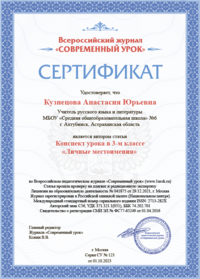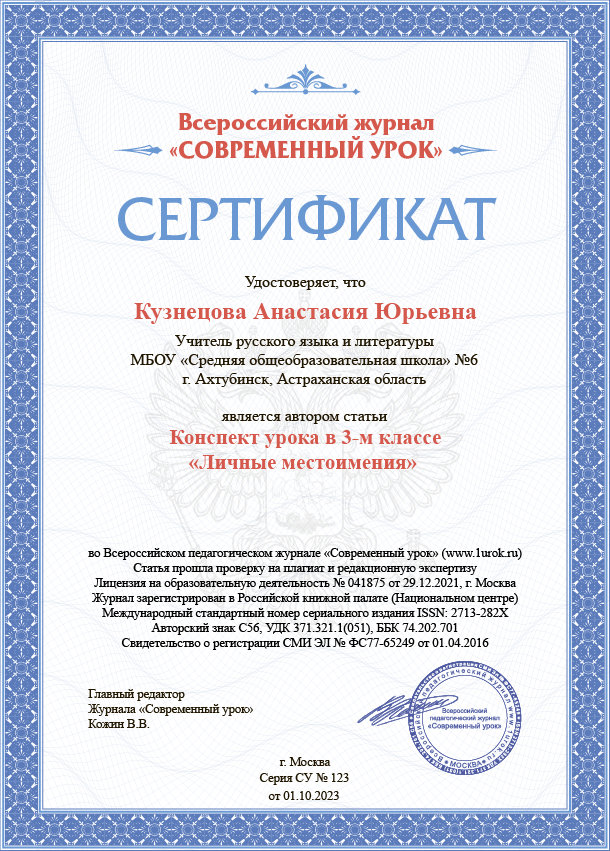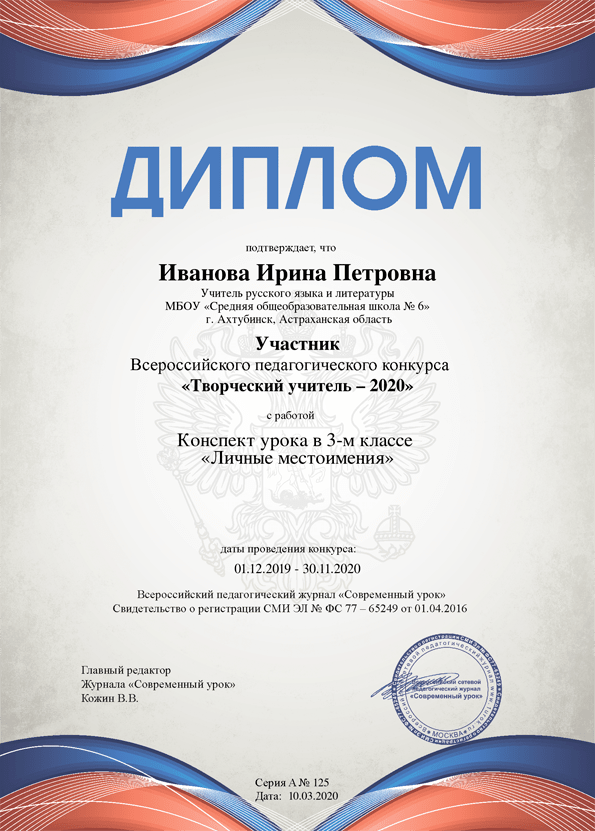Урок-проект с элементами дискуссии «Advertising »
Автор: Максимик Олеся Валерьевна
Организация: ГОУ ЛНР «Перевальская СШ № 12 имени Геннадия Ширко»
Населенный пункт: ЛНР, г. Перевальск
Данный урок-проект с элементами дискуссии рассчитан на 1 учебный час. Выбранная тема – актуальна, интересная для обсуждения.
Заранее учеников делят на три группы (историки, социологи, теоретики), проводят исследовательскую работу. Учащиеся собирают и обрабатывают информацию в группах, а потом представляют её для обсуждения на заключительном уроке. Такая структура урока дает возможность каждому ученику выразить себя, показать своё видение темы перед слушателями и в то же время – пополнить знания по теме исследования.
Procedure
- Introduction.
T. Hello everybody! I'm glad to meet you again in our English lesson. Today we are going to have an unusual lesson-discussion on the topic «Advertising: How It Affects Us? ». We had been speaking a lot about different things concerning mass media. And today we can't but mention such very important notion as advertising. It penetrates all the spheres of our life. It so powerful that you can't just avoid it. And by the end of the lesson we should clear up this point. I mean: what is advertising: blessing or harm? with the help of our experts, historians, theorists and professionals.
2. Project work presentation. for three weeks.
Tasks between three groups were divided as follows:
Group 1 : «Social Poll». To conduct interviews with people of different age, sex, social status and ask 4 questions:
- Do we need advertising?
- Do you use products which are advertised?
- Does the quality of product correspond to the advertisement?
- What kind of advertisement do you pay attention to?
Group 2 : «Historians». To explore historical texts, to surf the internet and find out facts about the roots of advertising in the past. Where and when did it come from?
Group 3: «Theorists». To explore periodicals, scientific works and find information about the place of advertising in our society.
Each group has to analyse material and make necessary design work. In the lesson groups present their project works.
III. Discussion.
T. As you can see you come across advertising everywhere: when you read a newspaper, watch TV, go to a local grocery, take your e-mail etc. Everything is advertised nowadays so, it seems quite natural to make out at last whether advertising is our friend or foe. And we'll do that in the form of discussion. Students express their thoughts, ideas, opinion in support of advertising or against it.
Students' answer.
S.: Adverts give much useful information in a short form. They describe products
( give their price, where we can find or buy them). Advertising executives always think about the group of people who might want their products; are they young or old, how much money do they have etc.? But very often their messages are for people who should be quite rich. And this can be a disadvantage, because to my mind showing a gorgeous good-looking young man or a girl in an expensive car, though they have been working for all their lives.
S.: Advertising is offensive. Many ads shows Rolls-Roys, lavish casinos and cruises. I think that the mass advertising of deluxe merchandise in our country where most people are poor is extremely dangerous.
S.: Parents complain that their children keep beginning for Snickers and Mars candy bars which they can't afford. They often demand all ads be banned. I've heard that television stations are bombarded with letters and calls from viewers especially the elderly-protesting against ads for expensive products.
S.: I consider that pensioners and invalids can't go out, that's why the advert is good for them. Because they can watch TV or read a newspaper and after that ask somebody to buy any products they like and need.
S.: I don't agree, elderly people can buy all what they want, because the good quality products are very expensive, and they can't afford to buy them.
S.: I have heard that elderly people cannot buy some products which are being advertised, because they are expensive for them. And also they don't like the ads where the products are being advertised by famous persons, because they realize that not always the ads are true and right. But I think that young people and teenagers, who are interested in celebrities, would like to learn some information about these famous people from some true ads.
S.: Today we have been stating that advertising does more harm than good and mainly it concerns the ads showing the pictures of alcohol and tobacco products. I realize that the aim of advertising is to sell products and to get benefits, but they shouldn't forget about our health and, especially, about the health of our young generation.
S.: You are speaking about one side of medal. Advertising can be very helpful to people who carefully choose the adverts they watch or read. Some adverts can increase our knowledge of the outside world; because there are high-quality ads that help us understand many field of life: science, medicine, sports and so on.
S.: Advertisement benefits elderly people who can't often leave the house, they can buy things sitting at home, it is comfortable for them.
S.: But at the same time they are forced to buy many unnecessary things, which can be even harmful.
S.: This is especially true, concerning commercials which advertise medicines. My point is that some commercials should be banned. Nobody but a specialist may recommend what treatment is useful.
S.: Films are interrupted by ads. I can't concentrate my attention on what is going on. I don't like it.
S.: But I enjoy watching commercials, due to them I've got a new mobile phone.
S.: Sometimes they are not true, price of the same good in an advertisement and in real shop don't coincide. I wasted much time looking for a computer offered by one commercial. I failed. They didn't hear about such a price.
S.: We shouldn't forget about political adverts. They were very colorful, well-done on a good sort of paper, they promised much. But I know few people trusted them.
S.: We should remember that all adverts sell products. But very often executives forget about the Low of Advertising: they should be honest first of all, and very often they forget about this when it goes about their benefits.
S.: We are more or less busy people and don't have enough time to watch TV as much as we would like to. But when we have some spare time and turn on TV we find that it's pretty hard to concentrate on what you are watching or to remember a question in “How to become a millionaire?” because of a great number commercials on TV. I realize that moguls of TV business get helps of money advertising goods on their TV channels, but I'd rather watch a good film, than spend half of this time on watching ads.
Besides, such strong factors as human fears are widely used to persuade people to buy something. Fears of poverty, illness and different kinds of disasters make the most film customers buy insurances, set automatic alarms, take vitamins, use food supplements etc. We perceive this information on subconscious level. We should think twice before buying something. Perceive ads just like a list of offered goods. Remember the saying of a businessman: “ If you want to sell something, you must lie while advertising it”.
IV. Summing- up.
- Sencan.
T.: Let's summaries what you can say about advertising in the life of a person. Think a bit and give the adjectives to characterize it.
Student's answers
|
Serious Informative Truthful Interesting Shocking Boring Colorful Tasteless Useful
|
Harmful Deceptive Entertaining Exciting Humorous Dull Monotonous Amusing |
ADVERTISING IS
T.: So, we have come to the conclusion that advertising is many-sided as people are, as the world we live in. And it's really hard to say definite yes or no, against or in favors of advertising. Definitely true is that it exists, it's real, it takes place in our life. And it's our choice to watch it or not; to trust it or deny it. Be watchful!
2. Work assessment.
To evaluate students' project work the teacher gives charts with criteria of group work assessment to group leaders to fill in later considering each student's contribution into project work.
|
Student's name and surname |
Division of roles |
Coming up with ideas, generating ideas, talking initiative |
Selecting, getting information |
Implementation of ideas |
Participation in presentation |
|
1 point |
4points |
3points |
2 points |
2 points |
|
|
1. |
|
|
|
|
|
|
2. |
|
|
|
|
|
- Home assignment.
T.: That is all for today. Your hometask is to describe the advert which you like or can't stand. You may support your story with definite pictures, drawings, or photos.

 БЕСПЛАТНЫЕ семинары
БЕСПЛАТНЫЕ семинары





